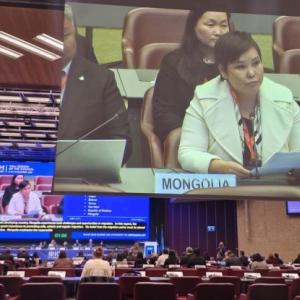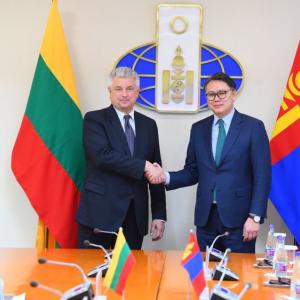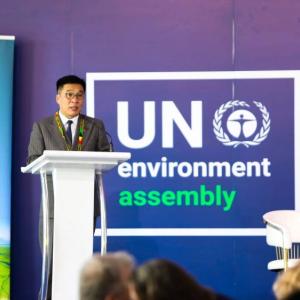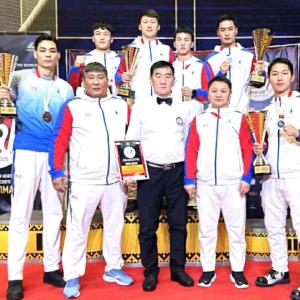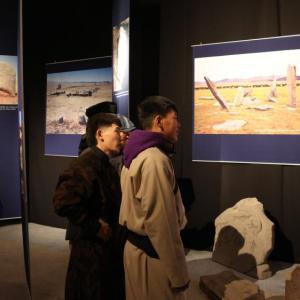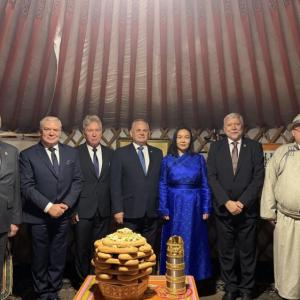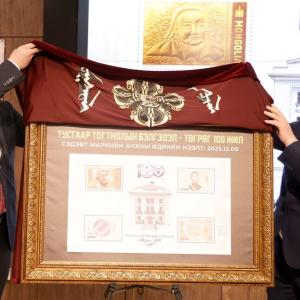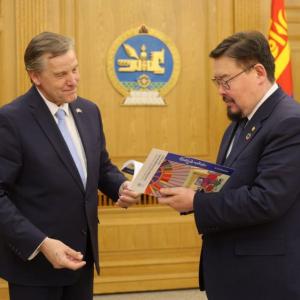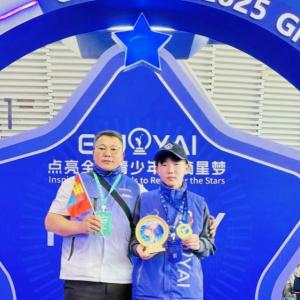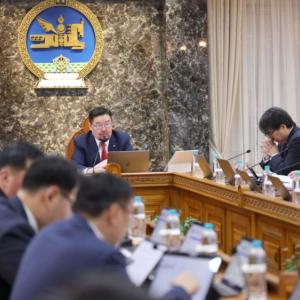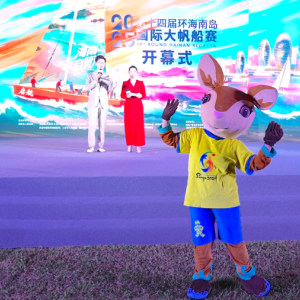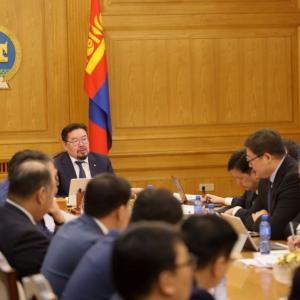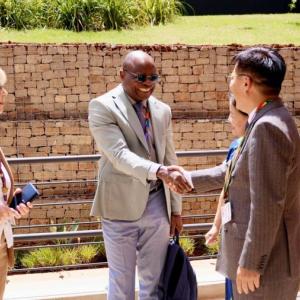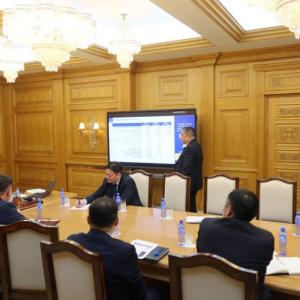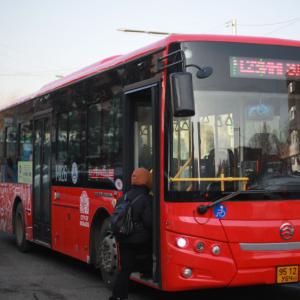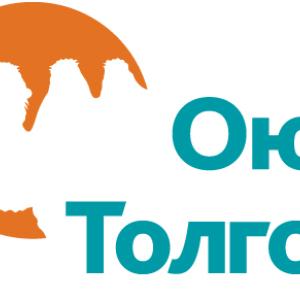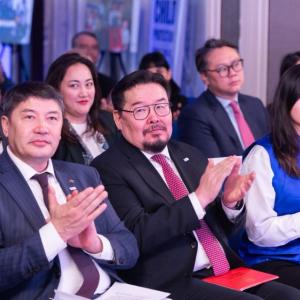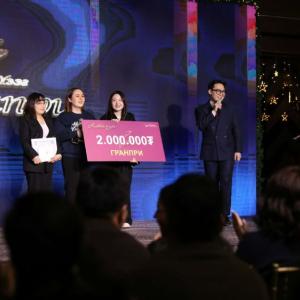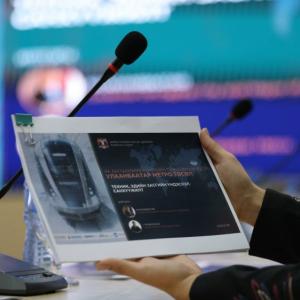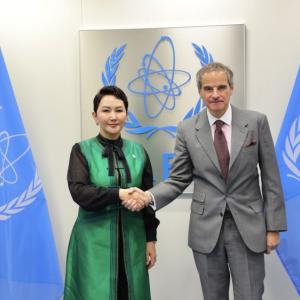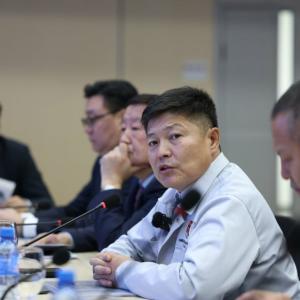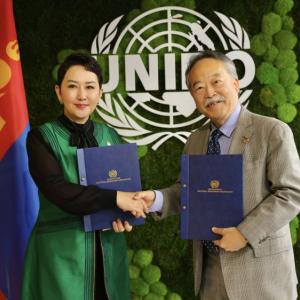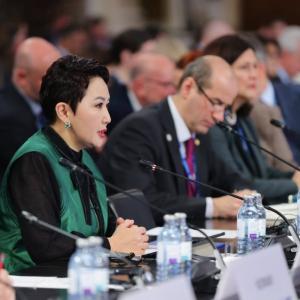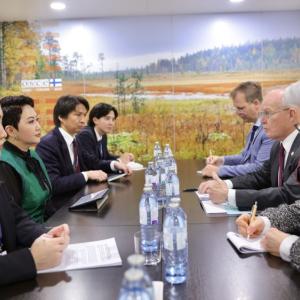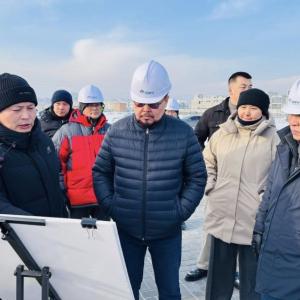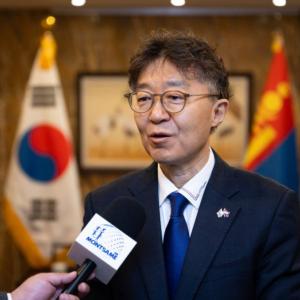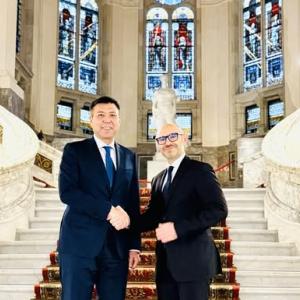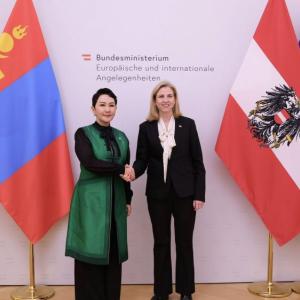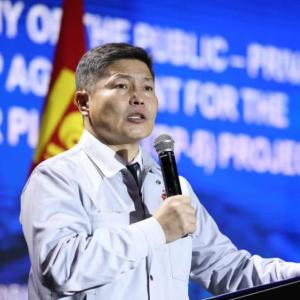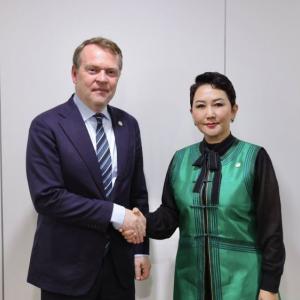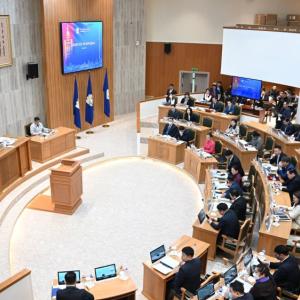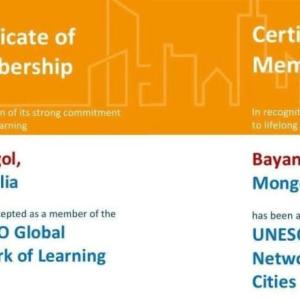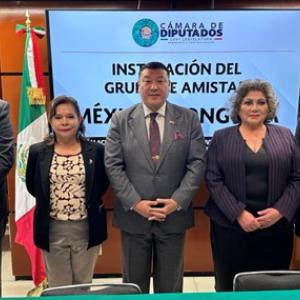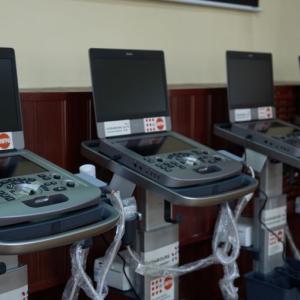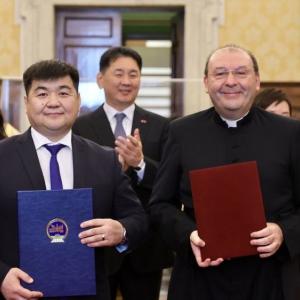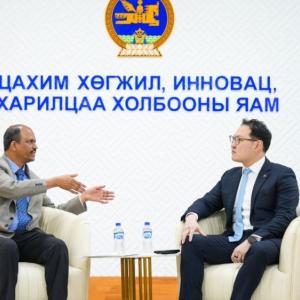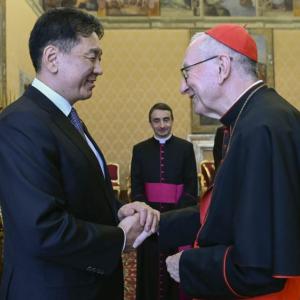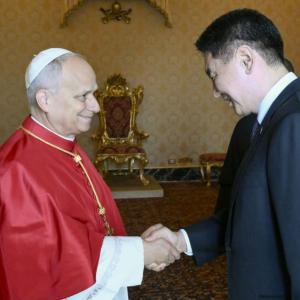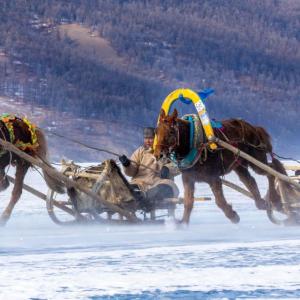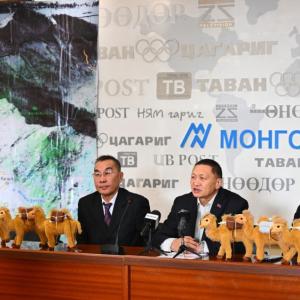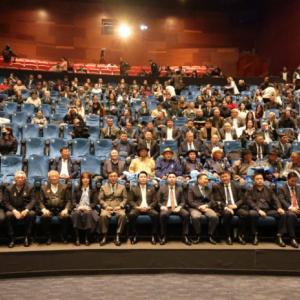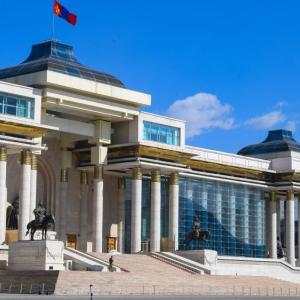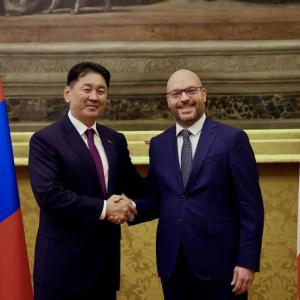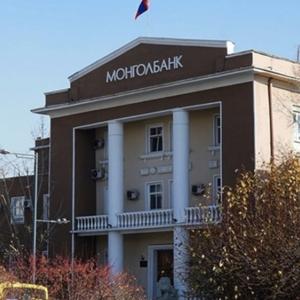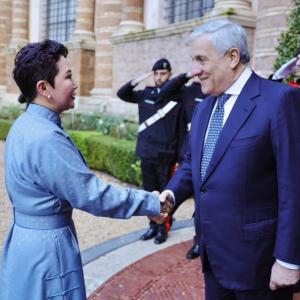“InvesCore’s achievements will serve as a stepping stone for many more Mongolian companies to enter the foreign market”
Economy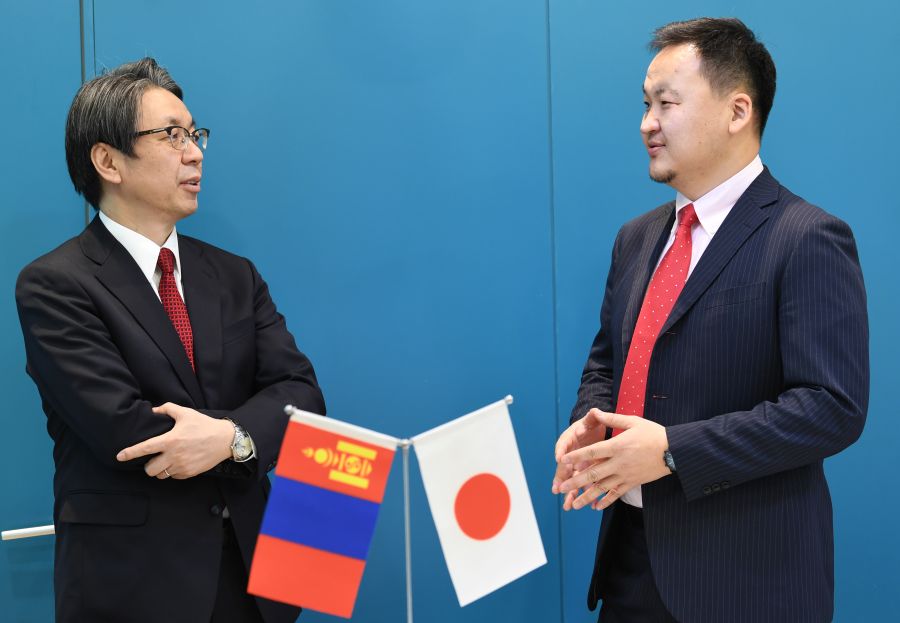
Ulaanbaatar /MONTSAME/. MONTSAME National News Agency is cooperating with the Embassy of Japan in Mongolia to introduce young business owners that are currently successful in the two countries’ business sector. This time, we invited Chairman of the Board of Directors of InvesCore Financial Group Ankhbold Bayanmunkh. The company currently runs operations in the sectors of finance and construction.
As one of the first graduates of Ritsumeikan Asia Pacific University (APU), he calls back his experience learning from other cultures as the foundation for having success in business today. With a company culture that considers their employees as its most important resource, the company is working to expand its finance and fintech operations in countries in the Central Asian region.
Ambassador of Japan to Mongolia Kobayashi Hiroyuki: You were one of the first students that graduated from Ritsumeikan Asia Pacific University by enrolling in the year of 2000. Rather than choosing a university in Mongolia, what was the reason for choosing to study at APU out of all the universities worldwide?
Ankhbold: When I was a teenager during the difficult times of the democratic revolution in Mongolia, I came across a book about famous Japanese business owners such as Morita Akio, Matsushita Konosuke, and Honda Soichiro. That was the moment when I began to have interest in Japan. As our schools had a 10-year system at the time, it was necessary to study for 2 years at a domestic university before enrolling in a Japanese university. During my second year studying at the School of Economics of the National University of Mongolia, I heard that an international university called ‘Ritsumeikan APU’ was being established. Learning that the university will not only have their programs taught in English, but also allow students to enroll without any prior knowledge of the Japanese language alongside creating the opportunity for students to study alongside other students from over 70 countries of the world, I became interested and decided to enroll in the university.
Looking back, I believe that my experience being exposed to the cultures of other countries by communicating with international students and professors played a significant part in learning the basics needed to run our business today.
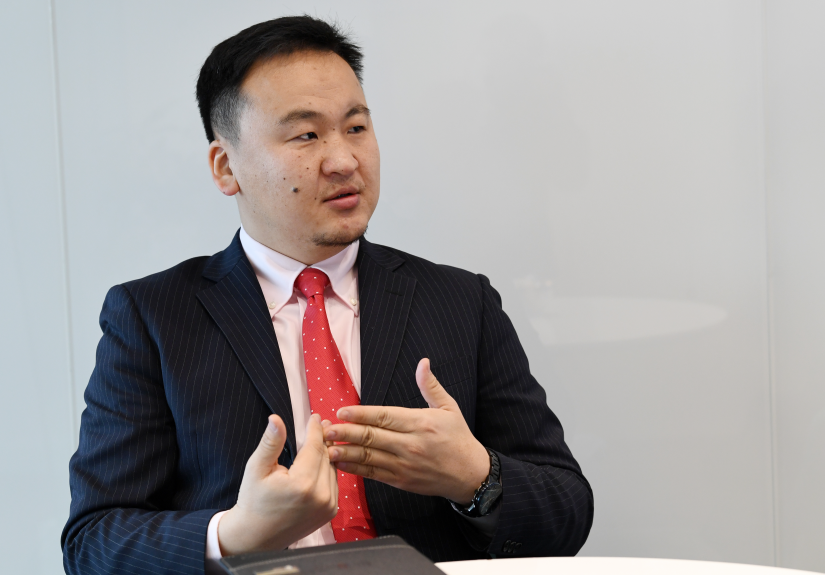
Ambassador Hiroyuki Kobayashi: In what ways were you connected to Japan after you graduated?
Ankhbold: After I continued on to study for a Master’s degree at the university, I worked at a Japanese company called ‘ABeam Consulting’ for six and a half years. At the department in charge of supply, I was able to gain experience by working on various short-term projects, such as those for high tech manufacturing and cosmetics production as well as with a European electronics sales company and an Australian logistics company. Although I initially planned to start a business in Mongolia after working at the company for 5 years, I worked for one more year in order to complete the project I was in charge of. After I came back to Mongolia in 2012, my wife and I started a business to introduce and promote Japanese brands such as ‘Daiso’, ‘Pigeon’, and ‘Goon’ in the country. In order to bring an idea that I had for quite a long time into reality, I co-founded InvesCore with one of my close friends in 2016. Later, we were able to get investment from Japanese investors, expanding our business.
Ambassador Hiroyuki Kobayashi: Could you share some of the memorable moments from your experience with the Japanese society and culture so far? Is there anything in particular that you want to be implemented in Mongolia as well?
Ankhbold: From all of the things I have learned about, I believe the most important is the accountability and the genuine effort put into helping others. In fact, in my opinion, this approach to work has become less and less prioritized in Mongolia recently.
In the Oita prefecture of Japan, there is a certain person who greatly helped and supported me - Mr. Yoichiro Oka. He took care of not only me, but other Mongolian students as well. Out of the many things that I learned from him, I want to talk about one specific time that was the most memorable. During my time as a student, I was requested help by an underclassman to help pay the rest of his tuition fee which was JPY 150,000. Although we were able to somehow gather JPY 50,000, we could not figure out how to find JPY 100,000 more - so I decided to ask Mr. Oka for help.
Mr. Oka is a kind-hearted man who helped many Mongolians with a considerable amount of money as he has an oil company based in the Kyushu region. Thus, when I requested help from Mr. Oka by visiting him at his home, he told me - a second-year student at the time, a rather unexpected answer. What he had told me was that he told me to draft a plan for repayment by carrying out a detailed study on my underclassman’s income and expenses and write a formal request with myself as the guarantor. When I brought the repayment plan that I had made using Excel and a guarantor form the next day, he ended up helping me make numerous changes and edits to the plan until I properly figured out how to do certain things such as calculating taxes, which were necessary to make the repayment plan perfect. After all that, Mr. Oka brought out exactly JPY 150,000 in cash from his pocket. And of course, my underclassman worked hard to earn money by getting a part-time job, and repaid the money as promised. Although JPY 150,000 may be considered as an “allowance” for Mr. Oka, this was a valuable experience that taught both of us the significance of loans and the responsibility one bears when introducing someone. On the flip side, it is an expression of the genuine intent to help the other person, so I am grateful for what he did to this day.
Ambassador Hiroyuki Kobayashi: Were there any difficulties in founding the company? In general, could you please tell us about how InvesCore was founded?
Ankhbold: All of my close friends that co-founded InvesCore with me have knowledge about finances. From management and human resources to technology, many parts of the financial field were trailing behind despite the development of the banking sector at the time. Due to this, we truly wished to improve the securities and non-bank financial services with the use of IT, and offer products that were entirely new. However, one of our hurdles were skilled human resources. Skilled employees usually tend to work at a successful company that has stable operations. It is rare for people to leave their position for a recently started business venture. There were often cases where InvesCore’s founders would have to convince potential candidates by explaining the company’s vision in the best possible way, just to have them join us. The difficulties we faced then are closely connected to our company’s culture of putting our employees as the utmost priority.
Ambassador Hiroyuki Kobayashi: Alongside offering various types of loans, your company is actively expanding its operations despite the current pandemic. Based on the experience running your company, what are your expectations and outlook for Mongolia’s socio-economic situation?
Ankhbold: I believe it would not be wrong to say that there are 5 types of natural resources that make up Mongolia’s economy: coal, copper, steel, gold, and zinc. In terms of logistics, most of the country’s exports and imports are currently dependent on China. As the domestic market is small, it is fairly difficult to run a large-scale business in Mongolia. If I were to take a guess at how Mongolia’s economy would further expand by taking these into consideration, I believe it is important to make investments in introducing export-oriented products and services such as IT products that are not dependent on transport on land.
Today, InvesCore Financial Group is focused on expanding its finance and fintech services into Central Asian countries. We believe that there are considerably more advantages to expanding our business in a country that is relatively similar considering certain factors, such as the way people think and the country’s culture as well as economy and legal environment. I am confident that InvesCore’s achievements will serve as a stepping stone for many more Mongolian companies to enter the foreign market.

Ambassador Hiroyuki Kobayashi: From the Japanese Embassy building, we are able to see an apartment building that was built by your company. What kind of strategy does your company implement in comparison to apartments that have been already built as well as those being currently built in Ulaanbaatar?
Ankhbold: We wish to introduce Japan’s real estate management system and services in Mongolia. The technology and know-how used in construction projects in Mongolia are developing with each passing day. Yet, due to insufficient management of real estate, buildings that have been sold tend to significantly drop in value. Thus, we are currently focusing on the construction of apartment buildings that have proper management for real estate properties alongside offering our services for investors to purchase, rent, and manage them. We aim to continue to strengthen and expand our business in the real estate industry.
Ambassador Hiroyuki Kobayashi: What is the future goal for your company?
Ankhbold: As I have said before, our nearest goal for the future is to introduce our products and business models that have shown to be fruitful in the Mongolian market in the markets of Central Asian countries. By expanding abroad, I am confident that our employees will also have opportunities to further improve.
One of the unique features of the financial sector is how easy it is to collect truthful information about the economy and market of a specific country. By utilizing this advantage, we plan to play a role in connecting companies of Mongolia and Japan.
Ankhbold: From my perspective, it seems that you actively work to expand the economic relations between Mongolia and Japan. What do you consider to be the most important in order to rapidly develop bilateral economic relations?
Ambassador Hiroyuki Kobayashi: Alongside taking necessary measures for the development of our own respective countries, I believe that it is important to expand economic relations between the two countries. In order to do that, attracting investment from Japan to Mongolia is currently the most important.
To start off, for instance, if a factory is built in Mongolia with investment from Japan, job opportunities will be created for Mongolians. The factory’s workers will also become trained in that specific industrial technology and management. On top of this, it will increase the profits of Mongolian companies which supply commodities and services that are required for the factory. And with the tax payments made by the factory, the state budget’s revenue will increase. However, as investors would only invest in profitable businesses, it is also necessary for Mongolia to create more favorable conditions for investment. I believe it is important to remember that Mongolia is competing with other countries to attract investment.
To Japanese people, I would like to say that as it has been 30 years since Mongolia transitioned to a democratic society, the country has entered the next stage of development. With Mongolia’s skilled workforce continuing to increase, it is currently a great time to invest.
As for the Mongolian people, I wish for the country’s investment environment to be further enhanced by learning from the successful practices of other countries.
Ambassador Hiroyuki Kobayashi: As someone who has previously studied in Japan, what would you like to say to youth that are aiming to study there as well?
Ankhbold: There are many things to learn from the country of Japan and its people. Excellent conditions have been created for one’s personal development.
My first advice would be to carefully consider the goal to be achieved by going to Japan, and define the path to reach it. Without a clear goal, the next steps would also be unclear. Secondly, it is important to have good knowledge about the history, culture, and customs of Japan and attempt to understand the local people’s words and actions. By making it a habit to try to understand the viewpoint of the other person before judging them based on their words and actions, it becomes possible to make many friends in a short amount of time and be successful in academics.
Ankhbold: If you get an opportunity to work as a director at any company in the world for a month, which company would you choose?
Ambassador Hiroyuki Kobayashi: Although there are a large number of companies that catch my attention, I want to challenge myself by starting a new business venture rather than working as a director at already-established companies. And of course, Mongolia would be where I would like to have this challenge.
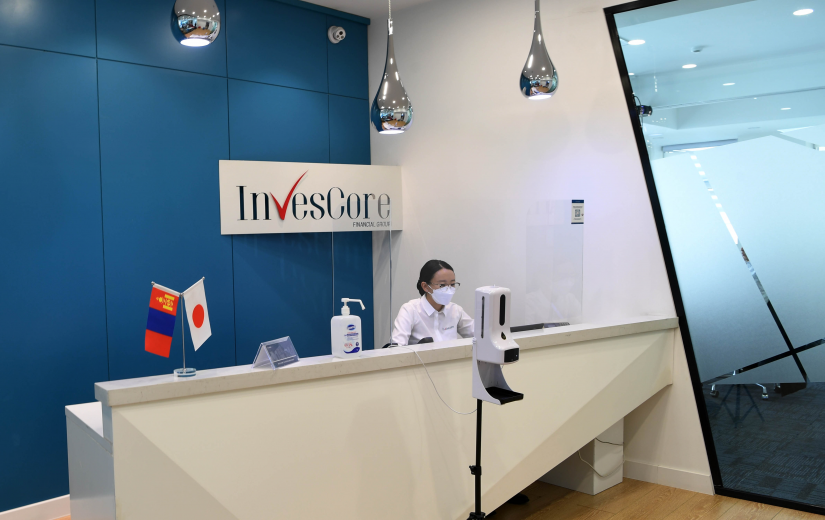
 Ulaanbaatar
Ulaanbaatar






